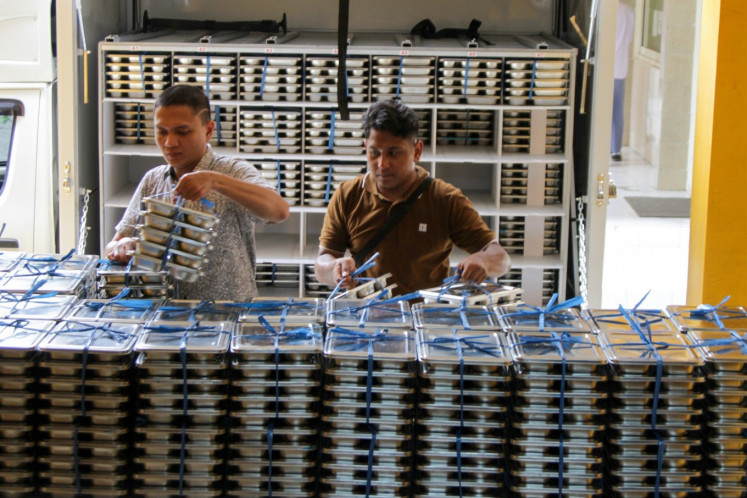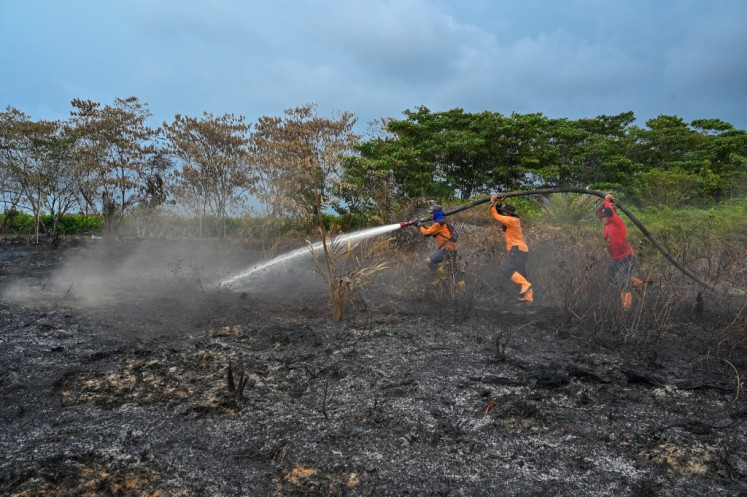Creating a sustainable society in fast-growing Indonesia
Indonesia’s economic development is expected to reach new heights in the next two decades
Change text size
Gift Premium Articles
to Anyone

I
ndonesia’s economic development is expected to reach new heights in the next two decades. It is already the world’s 17th-largest economy and the sixth- largest among developing countries.
But development comes at a price. With new roads and our increased ability to own cars, comes pollution and traffic. More urban job opportunities lead to overcrowding and as we live much longer today than our parents and grandparents, we face new healthcare issues.
So the question is: How do we balance the need for a sustainable society and environment with economic growth?
There are many definitions for a sustainable society, but generally it means how we maintain and improve our quality of life, for humanity, the environment and the economic well-being of future
generations.
This means that everyone has the chance to develop in a free, well-balanced society and in harmony with his or her environment.
A sustainable society takes into account dozens of aspects of our lives, from food self-sufficiency to education, governance, clean water, energy consumption, natural resources and healthy living. According to the Netherlands-based Sustainable Society Foundation, Indonesia ranks 104 out of 151 countries in sustainability so it is clear there are many areas we need to work together on to improve.
So what quality of life issues matter to most Indonesians? A recent Economist Intelligence Unit (EIU) report shed some light and insights on this issue.
When compared to neighboring Singapore and Malaysia, people here feel more disappointment in many areas of health and well-being. Stress, physical health and economic and career issues top the list of concerns and after age 55 these concerns grow.
More than a third of people said they were not satisfied with their overall health. Major concerns include high cholesterol, declining vision, stroke, widespread influenza and joint pain/arthritis, while women included cancer as a top issue.
However, less than one in 10 says they see the doctor regularly and just one in five are comfortable talking to their doctor or doing what their doctor says.
In a sustainable society, everyone should be able to reach his or her full health potential.
Life expectancy has doubled in Indonesia in the past 50 years and with an increase in the elderly population comes an increased need for care for chronic conditions and access to affordable healthcare.
Caring for aging parents and other family members is a major concern for most people here. Women were long considered the main caregiver for aging family members, but as more and more women enter the workforce, new solutions to care are needed. Home healthcare technology can provide the answer for many senior citizens and their families.
Home healthcare empowers patients to self-manage their conditions and helps avoid high-cost institutional and hospital settings allowing care in patient’s homes and communities. To make this happen, public-private partnerships are needed. Governments need to create an environment that fosters dialogue and collaborations between policy makers, healthcare providers and other stakeholders to design products that offer benefits to both individuals and societies.
The environment in which we live also plays an important role in any sustainable society. When asked about what kind of communities people want to live in, most Indonesians ranked access to clean water and electricity as well as schools and local hospitals at the top of the list. Other factors that affect quality of life, such as safety and crime rates, pollution and smog or garbage pick-up, are also considered important.
With rapid urbanization, cities are destined to become home to a majority of the earth’s population and already, they are responsible for 75 percent of global energy consumption. New lighting technology such as LED systems can contribute more than energy efficiency and economic development to the city.
It can provide a better overall experience for urbanites, as well as boosting safety and security in streets, pedestrian areas, parks and green spaces. When it comes to sustainability in the cities of tomorrow, new lighting technologies offer solutions that are both green and socially beneficial.
Despite these issues, Indonesia’s prospects are promising and the good news is most people feel better or just as good as they did five years ago.
As a new and emerging economy, the country can seize the opportunity to become sustainable, inclusive and environmentally sound by balancing economic progress with social progress. Many areas of improvement are clear and we can take action now.
We can achieve this through public-private partnerships. This will ensure that the experience of healthcare and urban planning experts is used to provide solutions to ensure the country is on the path to a becoming a sustainable society that meets the needs of communities today and the future generations of tomorrow.
The writer is president director of PT Philips Indonesia. The article is a personal opinion and does not represent the company.









